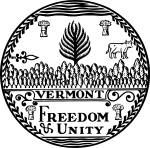| Elections in Vermont |
|---|
 |
A general election was held in the U.S. state of Vermont on November 2, 2004. All of Vermont's executive officers were up for election as well as Vermont's at-large seat in the U.S. House and Class 3 U.S. Senate seat. The 2004 presidential election was also held at the same time.
Contents
- Governor
- Lieutenant governor
- Republican primary
- Democratic primary
- Progressive primary
- General election
- Secretary of State
- Democratic primary 2
- Republican primary 2
- General election 2
- Treasurer
- Democratic primary 3
- Republican primary 3
- General election 3
- Attorney general
- Democratic primary 4
- Republican primary 4
- Progressive primary 2
- Liberty Union nomination
- Libertarian nomination
- Grassroots nomination
- General election 4
- Auditor of Accounts
- Democratic primary 5
- Republican primary 5
- Liberty Union nomination 2
- General election 5
- References
- External links















